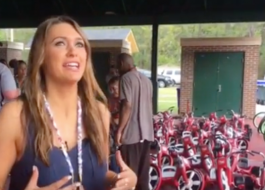
After six years in college working towards a teaching degree and a passion for improving the lives of the students she teaches, elementary school teacher Rachel Wiley is drowning in student loan debt and is barely able to meet her monthly bills.
"I love my students, I love my job, and I feel fulfilled. But I'm broke," 29-year-old Wiley wrote in an op-ed in Teachers United, which The Washington Post published in full.
She further described her financial situation:
I am lucky compared to some. I make enough that I was able to buy my own home. I can afford groceries each week. I have running water, electricity, and both my husband and I have working (ish) vehicles. We make it. But just barely. Each month, as I sit down to budget, I am discouraged. I feel as though I have failed in some ways."
The financial disparity between the teaching profession and other similar jobs in the US is well documented. The gap between public teachers and other public officials ballooned to the largest point ever in 2015, according to report from the Economic Policy Institute. And compared to all college goers, teachers made 17% less than other similarly educated workers.
Further, US teachers are underpaid compared to their peers in other developed countries. The average annual salary for US teachers was about $54,000 in 2013. In Luxembourg, the top-paid country, teachers earn about $100,000 a year.
Despite these factors, teachers are sometimes branded whiners by politicians. Republican Gov. John Kasich, for example, hit out at teachers at a Republican education summit in 2015.
"If I were, not president, but if I were king in America, I would abolish all teachers' lounges where they sit together and worry about 'woe is us,'" he said.
Wiley took aim at this type of criticism. "Is it whining, or complaining, to say that after six years in college I deserve more? I don't think so," she said.




